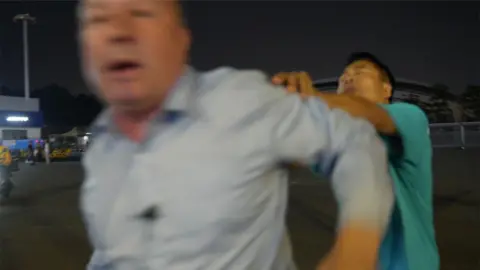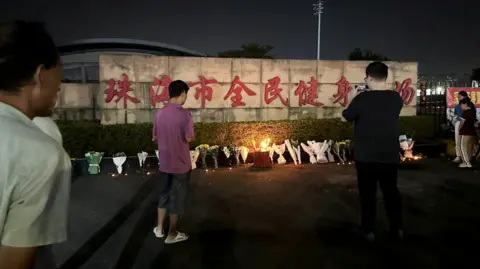When horror hits China, the first instinct is shut it down
The gates outside the Zhuhai sports complex in China were closed. Inside, the stadium was in darkness, as were the grounds around it.
It was here, hours before, where dozens of people were killed when a man drove an SUV into a crowd. Many more were injured.
Only security guards appeared to be moving around behind the fence when the BBC arrived, and they had been ordered to keep an eye out for reporters.
One approached us asking: "Are you journalists?" When I asked why he wanted to know, he replied: "Oh just to understand the situation."
He and a colleague took photos of us and started making calls, watching us as they did.
Outside the gates people passed by to catch sight of the aftermath. But among them was a group of around a dozen people more interested in us.
A women started calling to the others: "Look, foreigners, foreigners."
Soon a man who was with her was aggressively interrupting our reporting, grabbing me and shouting.

Often, when sensitive stories like this unfold in China, local Communist Party officials organise groups of cadres to pretend to be outraged locals who have been given the role of targeting foreign reporters and preventing any coverage.
Invariably it doesn't stop the stories, it just makes China look bad.
After former Premier Li Keqiang died last year, crowds of these loyalists were sent to the street outside his old family home. Any journalist that arrived was surrounded and shouted at, pushed and abused.
Premier Li's death was sensitive to the party not only because it was sudden and unexpected - but also because he was the last of the old liberal wing. It signalled that the party was now completely stacked with loyalists of President Xi Jinping.
But even for much more minor incidents the same things happen.
Last month, we travelled to a shopping mall in Shanghai where a man had randomly stabbed strangers to death.
The entire location had been cleansed of any evidence within hours of this horrible event taking place. By the morning after, the mall was up and running again as normal: no police crime scene tape, no flowers for the dead.
On one level, you can understand this - many of these inexplicable assaults on the community are copycat in nature. Tuesday's attack is not an outlier, though it is shocking for its death toll.
But officials here sometimes want these bad things to simply go away as quickly as possible.
Hours after our confrontation outside the site of the Zhuhai attack, carloads of police had arrived to better manage the situation.
A crowd of residents had also gathered to light candles to remember the dead, and videos shared on social media showed lines of volunteers at hospitals offering to donate blood.
President Xi has called on officials to manage society's problems in order to prevent this type of thing happening again in the future.
But, again, China is left wondering what has driven someone to such inconceivable horror. It is impossibly difficult to find the answers to this one.
 Reuters
Reuters